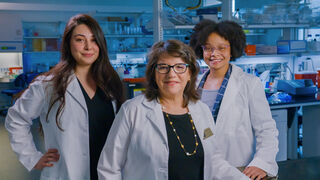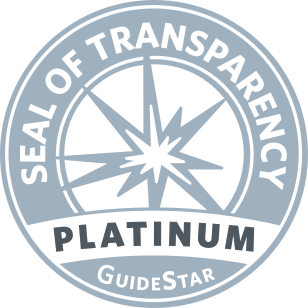“The Future Holds Promise” on International Day of Women and Girls in Science
Beacon Stories
International Day of Women and Girls in Science is celebrated globally to recognize the critical role women play in science, technology, engineering, and mathematics. To honor this vital day, the Foundation is sharing the story of Dr. Esther Biswas-Fiss.
International Day of Women and Girls in Science is celebrated globally to recognize the critical role women play in science, technology, engineering, and mathematics. To honor this vital day, the Foundation is sharing the story of Esther E. Biswas-Fiss, PhD, MB(ASCP)CM Professor and Chair, Department of Medical and Molecular Sciences; Director, Graduate Programs in Medical Sciences; Director, Programs in Applied Molecular Biology and Biotechnology, at the University of Delaware, College of Health Sciences.
Dr. Biswas-Fiss is not only a first-generation college graduate but also the first in her family to finish high school. When she first started her undergraduate studies at the University of Washington, she did not have a single female professor. The first time Dr. Biswas-Fiss finally encountered a woman in science was when she started her PhD program.

Dr. Esther Biswas-Fiss, Jazz Jones, and Senem Civek posing in their lab.
“Throughout my graduate and postdoctoral studies, I have met a lot of very powerful, strong, excellent women scientists that have made wonderful discoveries,” notes Dr. Biswas-Fiss. “There’s a wonderful opportunity for women in the field of vision research.”
Dr. Biswas-Fiss started her work as a chemist about 25 years ago and gravitated toward biomedical research. However, after attending an Association for Research in Vision and Ophthalmology (ARVO) conference, she became interested in using her skills as a biochemist to contribute to vision research.
“The vision research field is unique in that we have a great understanding and communication between scientists and clinicians, and we know a lot about genetics and biochemistry,” says Dr. Biswas-Fiss. “We're really poised in the area of vision to implement those translational therapies like gene augmentation therapy, CRISPR, stem cell therapy, and biologics. The eye is really unique as an atomical organ to be receptive to those kinds of therapies that are maybe more challenging for diseases like cancer, diabetes, or cardiovascular disease.”
The Foundation Fighting Blindness awarded Dr. Biswas-Fiss an Individual Investigator Research Award in June 2023, which is designed to concentrate research in areas with the greatest potential to move toward treatments and cures for inherited orphan retinal degenerative diseases and dry age-related macular degeneration.
“We are so grateful to the Foundation Fighting Blindness for their generosity and for supporting our research,” says Dr. Biswas-Fiss. “It is seen as a very prestigious award, so it isn’t just about the money, which of course is important and allows us to continue our work, but it’s also that this eminent group of scientists has given me the ‘Good Housekeeping’ seal of approval.”
Her work being funded by the Foundation is titled, “Deciphering the Impact of ABCA4 Genetic Variants of Unknown Significance in Inherited Retinal Disease Prognosis.” Dr. Biswas-Fiss is using computational modeling and experiments to determine whether ABCA4 variants of unknown significance (VUSs) lead to ABCA4-related disease. Solving these VUSs cases are critical to meet inclusion criteria in a clinical trial for ABCA4 therapies.
“Our task in the laboratory is to use computational techniques, so using computer modeling and in silico techniques, in combination with biochemical approaches, to try to make sense of these variants of unknown significance,” says Dr. Biswas-Fiss. “We create proteins using recombinant DNA technology that harbors the same mutations that we see in the patients with the same genetic variants, and then we study how those behave biochemically relative to the normal or wild type protein.”
Dr. Biswas-Fiss explains that today the ABCA4 gene has over 3,000 genetic variants that have been identified in individuals when 25 years ago, there were only 200 variants identified. Of those, 1,500 are associated with the building blocks that make up the ABCA4 protein, meaning they could potentially affect the function of the protein and lead to disease.
“About 60% of those 1,500 are variants of unknown significance, and those patients are ineligible to be enrolled in clinical trials because they really have to know what the significance is of those variants,” explains Dr. Biswas-Fiss. “And that's where our laboratory comes in and is hoping to make a difference.”
Dr. Biswas-Fiss also notes that the importance of genetic testing has also really come to light in recent years and that her team is helping to fill in that roadmap from learning about genetic information to then getting treatment.
“10 to 15 years ago, it was difficult for patients to access genetic testing because many times their insurance would not cover it because it wasn’t necessarily actionable,” Dr. Biswas-Fiss recalls. “Thanks in part to the Foundation Fighting Blindness, funds have become available so patients whose insurance won’t pay for the genetic testing can have it done now, which has really changed and is so important.”
Dr. Biswas-Fiss is now guiding the next generation of scientists to make an impact in the field. One of her students has been studying with her for the last nine years. She's even leading the charge globally, as one of her students is from Turkey.
“It's a very, very exciting time to be in science, and now I’m able to tell my students that in your lifetime, you’ll be able to see the fruit of your labor,” says Dr. Biswas-Fiss. “When I started out 25 years ago, I couldn’t imagine that we would be in the position we are in today. As a researcher, what’s difficult is that there isn’t instant gratification; sometimes, the road is long and hard. But we’ve really gotten to a point in our research now where we can make a difference. It's all these little pieces of science put together, not just from our lab but from other labs too, that is going to lead to those long-term gains that we see for patients. The future holds promise for individuals affected with inherited retinal diseases.”
This Beacon Story is sponsored by Johnson & Johnson.





